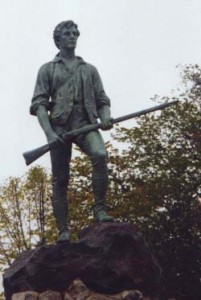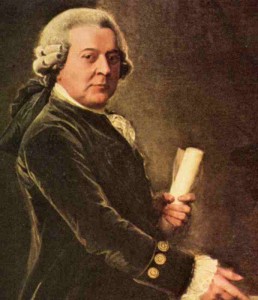 On this date 237 years ago—April 19, 1775—riders spread throughout the Massachusetts countryside warning citizens that the British Regulars were coming out of Boston. Why the warning? Those troops had two goals. The first was to capture “rebel” ringleaders Samuel Adams and John Hancock at Lexington where they were staying, and send them to Britain to be hanged. The second was to take possession of the area’s militia stores in a town called Concord. They accomplished neither, but they did start a war for independence.
On this date 237 years ago—April 19, 1775—riders spread throughout the Massachusetts countryside warning citizens that the British Regulars were coming out of Boston. Why the warning? Those troops had two goals. The first was to capture “rebel” ringleaders Samuel Adams and John Hancock at Lexington where they were staying, and send them to Britain to be hanged. The second was to take possession of the area’s militia stores in a town called Concord. They accomplished neither, but they did start a war for independence.
Paul Revere was one of those riders that day, and he successfully warned Adams and Hancock in time before he himself was captured by a British patrol. As the 700 troops entered Lexington, they encountered 70 Minutemen, part of the overall militia, standing on the town’s main square. There was no way this small body of shopkeepers and farmers was planning to engage in an all-out battle with regular troops. It was primarily a statement of principle. Their leader, Capt. John Parker, is reported to have told them, “Don’t fire unless fired upon, but if they mean to have a war, let it begin here.”
The British commander ordered the Lexington men to disperse. Knowing they had no chance to win this battle, they were in the process of dispersing when shots rang out—from which side depends on the telling—but when the incident ended, eight Lexington men were dead, and the troops continued their march toward Concord.
 Concord had been warned in time. The militia stores were removed for safekeeping, and when the troops arrived, they had nothing to confiscate. They did, however, start burning some property in the middle of the town. Minutemen by the bridge outside town saw the smoke and flames and assumed their town was being burned down. This led to a skirmish on the bridge with some of the British troops. When it became obvious the goals were now unachievable, the British beat a hasty retreat to Boston.
Concord had been warned in time. The militia stores were removed for safekeeping, and when the troops arrived, they had nothing to confiscate. They did, however, start burning some property in the middle of the town. Minutemen by the bridge outside town saw the smoke and flames and assumed their town was being burned down. This led to a skirmish on the bridge with some of the British troops. When it became obvious the goals were now unachievable, the British beat a hasty retreat to Boston.
Unfortunately for them, the entire countryside was now up in arms—literally. Using rocks, trees, and stone walls for cover, the militia sniped at the troops all their way back to Boston. The British troops committed a number of atrocities in their retreat, which embittered the colonists even more, but the militia successfully harassed the troops the entire way. Once they had them back in Boston, 15,000 militia ringed the city to ensure they couldn’t come out again to do more harm.
 The fighting had begun, and it wouldn’t end until October 1781 at the Battle of Yorktown. John Adams, writing to his wife Abigail shortly after news of the events of April 19, gives us a sentiment that is still poignant today when he said:
The fighting had begun, and it wouldn’t end until October 1781 at the Battle of Yorktown. John Adams, writing to his wife Abigail shortly after news of the events of April 19, gives us a sentiment that is still poignant today when he said:
Posterity! You will never know how much it cost the present generation to preserve your freedom! I hope you will make a good use of it. If you do not, I shall repent in Heaven that I ever took half the pains to preserve it.
We are that posterity. Do we really understand what it cost that generation to establish our freedom? Are we making good use of it? Sobering questions, to be sure.
